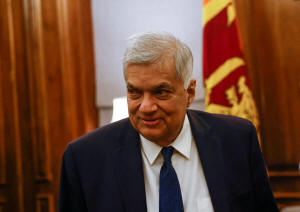India makes inroads into Sri Lanka under China's long shadow
 Send a link to a friend
Send a link to a friend
 [December 27, 2022]
By Uditha Jayasinghe and Devjyot Ghoshal [December 27, 2022]
By Uditha Jayasinghe and Devjyot Ghoshal
COLOMBO/NEW DELHI (Reuters) - When Sri Lanka slid into its worst
economic crisis in seven decades leading to deadly riots and alarming
shortages of fuel, food and medicines earlier this year, its giant
northern neighbour stepped into the breach.
India provided about $4 billion in rapid assistance between January and
July, including credit lines, a currency swap arrangement and deferred
import payments, and sent a warship carrying essential drugs for the
island's 22 million people.
Now, as Sri Lanka closes in on a $2.9 billion loan deal from the
International Monetary Fund (IMF) and its economy stabilises, India is
seeking to land ambitious long-term investments, with an eye on
countering the influence of regional rival China, a government minister
and three sources said.
"What we are looking at right now is investment from them," Sri Lankan
Foreign Minister Ali Sabry said in an interview this month, referring to
a range of projects worth over $1 billion currently under discussion
that would help bolster India's presence in Sri Lanka. "They're willing
to invest as much as it takes."
"India is probably strategically looking at that...because of their
security concerns," Sabry said.
India's foreign ministry did not respond to questions from Reuters on
its plans and strategic aims in Sri Lanka.

Regional security would always be a focus for New Delhi, a source with
knowledge of the matter told Reuters, at a time of persistent friction
with China along their Himalayan frontier.
"There are no two ways about security concerns," the source said, asking
not to be named because of the sensitivity of the issue. "In terms of
long-term engagement, it is investment that is being focused on."
Besides seeking Indian investments to set up renewable energy and power
projects in the north of the island, Sri Lanka is also keen to work with
New Delhi on expanding and developing the harbour at Trincomalee in the
northeast into a major port, several officials said.
Taking advantage of northern Sri Lanka's proximity to India, these
projects could help New Delhi balance China's extensive infrastructure
projects in the south of the island that have been built up over the
last 15 years.
Sri Lanka's Tamil-dominated north also shares ethnic ties with southern
India's Tamil Nadu state.
CONCERN ABOUT CHINA
The talks, and the scale of Indian aid this year that far exceeds other
donors, underline New Delhi's efforts to claw back influence in the
island located just a few miles off its southern tip along busy
waterways linking Asia to Europe.
In late June, a fortnight before tens of thousands of angry Sri Lankans
took to the streets and forced President Gotabaya Rajapaksa to flee the
country, India's top diplomat flew into the island nation's main city of
Colombo for meetings.
Foreign Secretary Vinay Kwatra, who was accompanied by officials from
India's finance ministry, met Rajapaksa and Prime Minister Ranil
Wickremesinghe, among others.
In their conversations with the Sri Lankan leadership, Kwatra and other
Indian officials flagged China's position as a key geopolitical concern,
according to a Sri Lankan government source with direct knowledge of the
discussions.

The source, who declined to be named because he was not authorised to
speak to the press, said China's huge role in the island's economy,
which had mushroomed under previous Rajapaksa administrations, was
troubling India more than anything else.
Details of the June meeting have not previously been reported.
Kwatra and the Indian and Sri Lankan foreign ministries did not respond
to questions from Reuters on the June meetings.
In a statement released immediately after Kwatra's visit, the Indian
foreign ministry said that talks had mainly focused on economic issues,
including deepening investments. It made no mention of China.
New Delhi has long been concerned about China's clout in its
neighbourhood, including Nepal, Bangladesh and Sri Lanka. Sensitivities
have been heightened, and diplomatic relations frayed, since Indian and
Chinese troops clashed along a remote Himalayan border in 2020, leaving
dozens of soldiers dead.
"We understand that it is their prerogative to look after their
security," Sabry said, referring to India. "And as far as Sri Lanka is
concerned, we don't want to contribute to any escalation of tension
between any countries."
China, meanwhile, has engaged with the Sri Lankan government on debt
restructuring that is required for the IMF deal to go through, besides
sending shipments of medicine, fuel and rice.
The World Bank estimates Beijing's lending stands at around $7 billion,
or 12% of Sri Lanka's $63 billion external debt.
"We are willing to work with relevant countries and international
financial institutions to continue to play a positive role in helping
Sri Lanka," China's foreign ministry said in response to written
questions from Reuters.
[to top of second column]
|

Sri Lanka's President Ranil
Wickremesinghe looks on during an interview with Reuters at
Presidential Secretariat in Colombo, Sri Lanka August 18, 2022.
REUTERS/ Dinuka Liyanawatte/File Photo

The ministry said it did not have details of India's assistance and
investment in Sri Lanka and that its own support of Sri Lanka was
"not targeted at third parties".
PERFECT STORM
Sri Lanka sank into a financial crisis after the COVID-19 pandemic
decimated tourism and remittances from citizens working abroad fell.
The war in Ukraine pushed prices for imports, particularly fuel,
sharply higher.
Rajapaksa's administration also resisted help from the IMF, meaning
foreign exchange reserves dwindled, worsening fuel and medicine
shortages.
Violent protests broke out as tens of thousands of people took to
the streets and stormed government buildings.
The president fled the country in July, and resigned. By then, Sri
Lanka finally engaged with the IMF and the two sides have since
struck a preliminary $2.9 billion loan deal.
But it was Indian assistance that helped Sri Lanka buy time.
"Without India, Sri Lanka would have unravelled as Lebanon did,"
said Uditha Devapriya, chief international relations analyst at
Factum, a Colombo-based foreign policy think-tank.
"Sri Lanka has clearly benefited from being the closest neighbour to
the most powerful country in the region. It is also in India's
interest to ensure stability in its backyard."
In October, Wickremesinghe - who took over as president in July
after Rajapaksa quit - unveiled a blueprint for Trincomalee, which
has a natural deep-water harbour, including a proposal to work with
India to develop a strategic port there besides setting-up a new
industrial zone and an energy hub, according to details released by
his office.
India and Sri Lanka are also in preliminary discussions on an
undersea cable to connect the power grids of both countries and a
fuel pipeline from southern India's mainland to northern Sri Lanka -
projects that could together cost at least $4 billion, according to
officials on both sides.

In the energy sector, India's state-run NTPC is working on a
100-megawatt solar power plant in Sampur in Trincomalee district
after the two countries signed an agreement in March.
In the northwest of Sri Lanka, India's Adani Group is awaiting
regulatory approvals for two wind power projects worth $500m in
Mannar region, Sri Lanka's Power Minister Kanchana Wijesekera said
in August.
Off the northwestern coast, ONGC Videsh Limited (OVL), the overseas
arm of Delhi's state-run Oil and Natural Gas Corporation, has set
its sights on exploration licences, and has had multiple discussions
with Sri Lankan authorities who are finalising regulations ahead of
inviting bids from global companies, two Sri Lanka energy ministry
officials said.
Both asked not to be named because discussions were ongoing.
Adani, NTPC and OVL did not respond to questions from Reuters on
their projects in Sri Lanka.
The push for oil and gas exploration was part of the discussions in
June, the source with knowledge of the talks said.
YUAN WANG 5
Foreign Minister Sabry said the Sri Lankan government was keen on
capitalising on India's growing economic prowess, particularly
through renewable energy and infrastructure projects, while
maintaining key relationships with other major allies, including
China and Japan.
Despite India's recent goodwill in Sri Lanka, New Delhi remains wary
of China's presence.
In July and August, the regional rivals became embroiled in a
diplomatic spat over a Chinese military survey ship, Yuan Wang 5,
that stopped at southern Sri Lanka's Hambantota port.
At that time, Indian Foreign Ministry Spokesman Arindam Bagchi said
that although India had given "unprecedented" support to Sri Lanka
during the economic crisis, New Delhi would not back down from its
security needs.

Despite India's crucial help during the financial crisis this year,
Sri Lanka still needs China - one of its biggest creditors - to
agree to a debt restructuring plan, along with India and Japan, to
clinch the IMF loan deal, Sri Lankan officials said.
"Chinese investment is very important, Chinese relationship is very
important," Sabry said.
"So I don't think even India or anybody expects Sri Lanka not to
work with China. To be fair by them, none of them have asked us."
(Reporting by Uditha Jayasinghe and Devjyot Ghoshal; Editing by Mike
Collett-White and Raju Gopalakrishnan)
[© 2022 Thomson Reuters. All rights
reserved.]
This material may not be published,
broadcast, rewritten or redistributed.
Thompson Reuters is solely responsible for this content. |